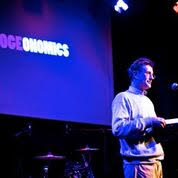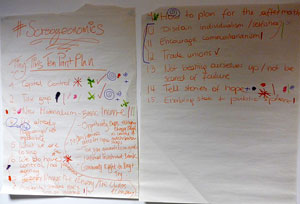
Scroogeonomics 2015
24.12.2015
A mean-spirited employer exploiting a low-wage economy to his own ends while undermining the human solidarity of families and communities. Charles Dickens' A Christmas Carol of 1843 sounds all too familiar on Christmas Eve 2015.
 David Boyle , author of the excellent book How to Be English explains the enduring relevance of Scrooge.
David Boyle , author of the excellent book How to Be English explains the enduring relevance of Scrooge.
"The phrase “bah! humbug!” has long since passed into the English language, as a symbol of the mercantile approach to Christmas. It did so six days before Christmas in 1843, when Dickens published A Christmas Carol, at his own expense and single-handedly reinvented an English Christmas – with roast Turkey, families, presents, bonhomie and a very English kind of over-indulgence.
The title of Dickens’ book was deliberately chosen. It made the story sound mythic, ageless and reached back to the days when the English sang Christmas carols – and hastened the day when they would sing them again. But then, this may not have been Dickens’ main intention when he wrote the book, though he carried on writing annual Christmas stories until 1849, when he was too busy with writing the great slab of David Copperfield to have time. His main intention was to extract a little generosity of spirit from the English in their most mercantile of moods.
And if we ever doubt that change is possible, a quick re-read of A Christmas Carol can reassure us. There never was a transformation quite so instant as Scrooge’s, but Dickens takes him through a process which makes it possible for us to have the same experience, part memory, part shame, part exorcism. As it is, he seems to have succeeded in resurrecting Merrie England from the bare, dry bones of utilitarianism and as such deserves the last place in this book – in the hope that someone might repeat the trick again some day soon."
Danny Dorling is one of the country's leading experts on inequality. Philosophy Football commissioned Danny to provide an explanation of Scrooge 2015. Danny's text is combined with cartoons by Ella Furness, and music we also commissioned from Nia in a short film produced by Simon Green of Eventful. Danny explaines the causes and consequences of inequality and how, despite the intervening 172 years since A Christmas Carolwas published, because of low wages, rising personal debt - especially student debt - and lack of affordable housing, 2015 remains positively Dickensian for many.
For a small company Philosophy Football has big ambitions. When we set out on the idea of linking Christmas 2015 to Dickens' Scrooge of 1843 we not only commisioned music and ideas plus David Boyle's reading of his explanation of A Christmas Carol but also a poem by Matt Abbott.

And in search of alternatives to Scroogenomics, Philosophy Football organised a seminar for a group of our customers and friends with Andrew Simms of the New Weather Institute who brought along a panel featuring the architect of 'Corbynomics', tax justice campaigner Richard Murphy, one of Jeremy Corbyn's economic advisers Ann Pettifor, and co-author of The New Materialism Ruth Potts. From their afternoon of duscussion they devised this 10-point alternative to Scroogeonomics.
- Capital Controls: the right wing in Britain campaign against membership of the European Union by appealing to fears over sovereignty and yet, ironically, they support a far greater threat to economic autonomy: unconstrained capital mobility. Step one in replacing Scroogeonomics is the ability to make finance a servant to the useful economy and not its master, subject to democratic checks and balances.
- Tackle the Tax Gap: the Government should publish and tackle the multi-billion tax gap – the difference between what companies and their wealthy owners should be paying and actually are. What’s missing is the glue that binds society together and pays for it’s needs and ambitions.
- Replace wasteful, unsatisfying and debt-fueled consumerism with a healthy relationship to the material world: good work in a green, circular economy in which we care for, share and repair goods can create a ‘new materialism’ that helps everyone have what they need and flourish within planetary boundaries.
- Better Economic Alternatives Already Exist: from banking to tax, investment, food, transport and energy the world is full of better policies. There are unsung stories of hope from communities producing their own renewable energy, creating their own currencies, growing their own food, running their own budgets and making the transition to a fair, zero carbon economy.
- Speak Up About What is Being Lost: from libraries to essential services and the arts, counterproductive austerity policies are destroying many of the things that makes life good and society hold together. Austerity creates a domino effect of lost income, it is not prudent
- We Have the Power to Change Things: a chaos economy is not inevitable, but a political choice made by those who simply don’t believe the mess should be managed and who, by-and-large, are wealthy enough to avoid the pain when things go wrong. We can choose to manage the chaos, rather than have the chaos manage us.
- There Will Be Another Crash: this time there is no excuse not to see it coming. We should plan now for what to do after in the inevitable state of flux, asking what sort of society we want and what kind of economy can support it. More than learning from the past so as not to repeat it, like there was for Scrooge himself, there will be a chance for a new beginning.
- We Are Better Together: our human ability to cooperate could be our greatest distinguishing feature among other animals, explaining our success as species. Culturally and economically we are interdependent yet economic policy promotes selfish individualism. Even the International Monetary Fund believes collective action through trade unions is vital for economic flourishing. The policy pendulum swung too far towards atomised individualism and must find a better, more communal balance.
- Do Not Fear Failure: building a better economy is not easy, those who try shouldn’t beat themselves up if things don’t always work because the forces aligned against progressive change are large.
- The Public Sphere Needs Re-asserting: from the neighbourhood to all our public goods, it is there to catch things when they fail – as it did, thanklessly, for the banking sector in 2007-2008 – and to make life better for all. Yet, through an ideological infatuation with private finance and interests, the Scroogeonomics of an overconfident establishment is undermining itself and the very public sphere that markets, and all of us, ultimately rely on
All for Christmas Eve 2015. 'We don't sell T-shirt' has always been, and remains, our proud boast. T-shirts as a platform for ideas and ideals. Creating sparks of creative collaboration through music, poetry, film and ideas. Enjoy the season and here's to a more peaceful new Year than the last one.